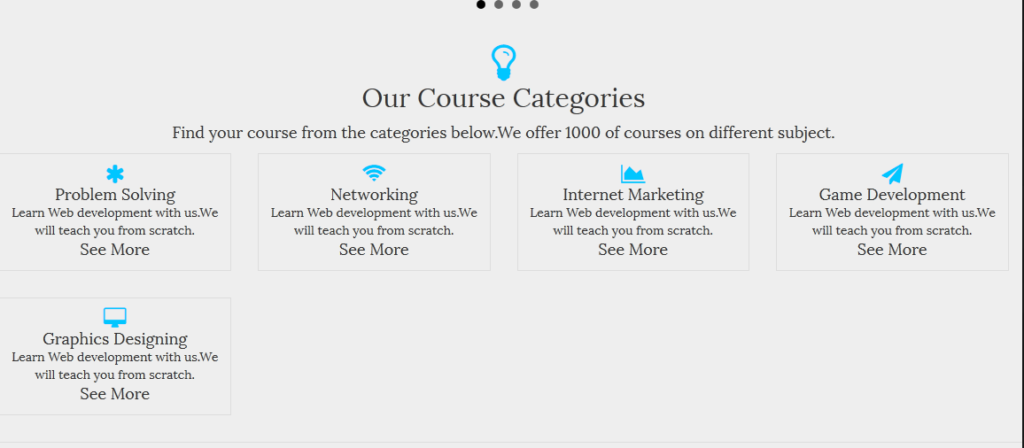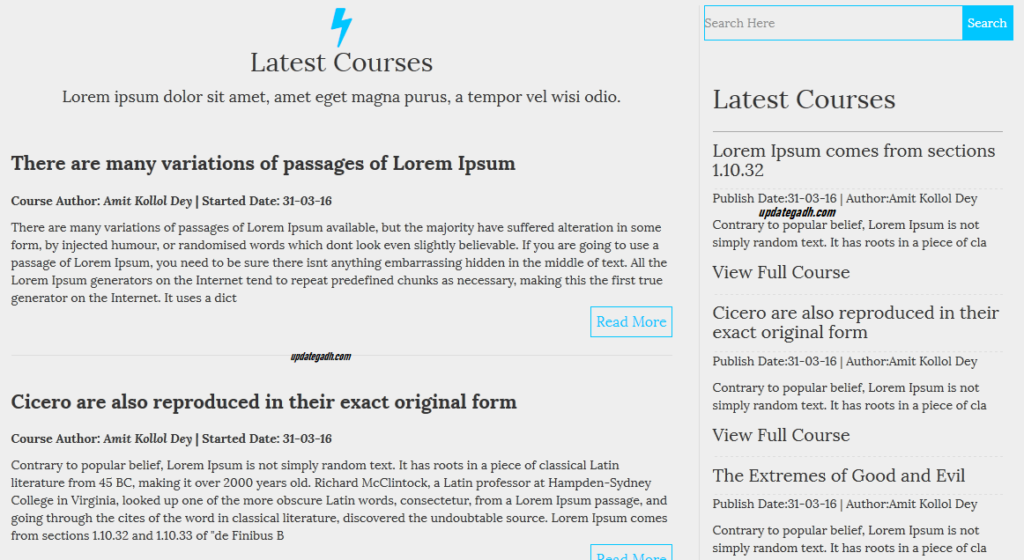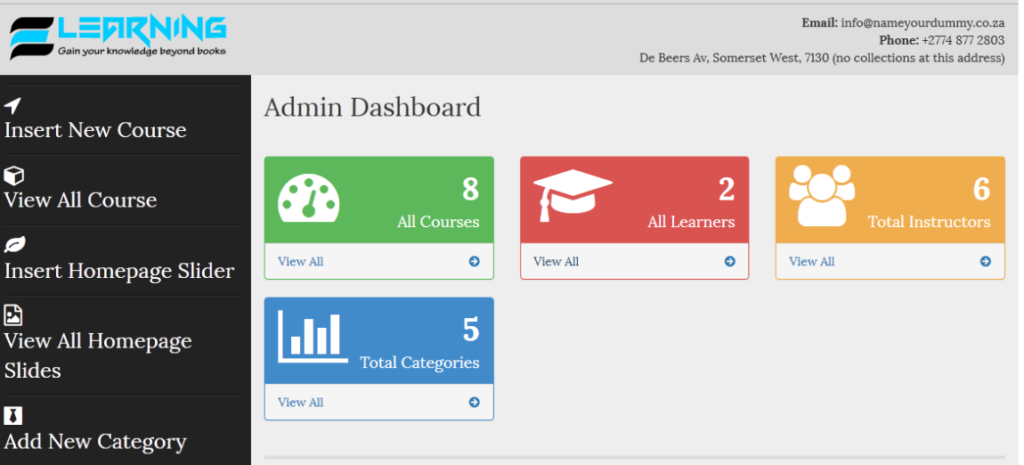Introduction Blog Site In PHP And MYSQL With Free Source Code
Welcome to our dynamic learning platform Blog Site In PHP And MYSQL With Free Source Code come together to empower your journey into web development! Immerse yourself in the world of coding as you explore the intricacies of PHP and MySQL, the dynamic duo driving countless websites and applications. Unleash your potential through hands-on experiences, building a foundation that goes beyond the basics.
Check 100+ PHP Projects with Source Code
What`s New
Blog Site In PHP And MYSQL With Free Source Code
- Graphics Designing:
- Unleash creativity in graphic design, where pixels craft compelling narratives and design principles come alive.
- Problem Solving:
- Master effective problem-solving, honing analytical skills and building a toolkit to confidently tackle challenges.
- All Course Categories:
- Explore a diverse spectrum of knowledge across technology, arts, humanities, and more, tailored to fuel your curiosity and career aspirations.
- Become An Instructor:
- Inspire learners globally by becoming an instructor, contributing to a vibrant community of knowledge seekers and creators.

Table of Contents
Design Approach
Project Name : Blog Site In PHP And MYSQL With Free Source Code
Language Used : PHP
Database : MySQL
User Interface Design : HTML,CSS,JAVASCRIPT
Web Browser : Google Chrome, IE8,
Software : XAMPP / Mamp/ Lamp (anyone)
Front end: HTML, CSS, and JavaScript
HTML: HTML is the language used to produce and save web documents. Notepad/Notepad++, VS code for example.
CSS stands for Cascading Style Sheets. Make an eye-catching layout.
Bootstrap is a responsive design framework. mobile-friendly website
JavaScript is a computer language that is extensively used in web browsers.
Back end: PHP and MySQL
- PHP is a technology that allows software developers to construct dynamically generated web pages in HTML, XML, or other document types based on client requests. PHP is free and open-source software.
- MySQL: MySql is a database that is commonly used for searching, updating, and managing data in databases.
Modules
For Users:
- Signup: Begin your learning journey by creating a personalized account. Your gateway to a world of knowledge awaits!
- Login: Seamlessly access your account, track your progress, and explore our diverse range of courses with just a click.
- View Blogs: Your feedback matters! Share your thoughts, ideas, and suggestions to enhance your learning experience.
- User Ratings and Reviews/Suggestions: Engage with course content through user ratings and reviews. Your insights shape the learning community.
Check : java Projects
The administrator has complete control over the system; he or she may add blogs, see all blogs, add and view categories, view published blogs, add and view site information, social connections, editors’ choices, and check admin metrics. The second key benefit is that it has an admin section where he/she can verify the latest site changes and maintain the site in maintenance mode. When creating a new blog, the administrator must supply a title, pick a category, include tags, content, photographs, date, author, and select a draft or publish state. He or she may easily alter the entire website from the admin panel. The admin panel includes a responsive dashboard for easy site maintenance.
For Admin:
- Post Blogs:
- Create and publish informative and engaging blog posts effortlessly. The admin panel provides a user-friendly editor for crafting content that resonates with the audience.
- Blog Categories:
- Organize your content systematically by assigning categories to each blog post. Users can easily explore topics of interest, promoting a curated and personalized learning experience.
- Drafts:
- Save and manage drafts seamlessly within the admin panel. Admins can work on content iteratively before finalizing and publishing, ensuring quality and relevance.
- Editor’s Choice:
- Highlight exceptional blog posts as “Editor’s Choice” to draw attention to outstanding content. This feature enhances user engagement by showcasing top-quality articles.
- Social Links:
- Integrate and manage social media links directly from the admin panel. Share blog posts across various platforms, expanding the reach of your content and fostering community interaction.
- Admin Stats:
- Gain valuable insights into the platform’s performance with detailed admin stats. Track metrics such as user engagement, blog post views, and platform traffic to inform strategic decisions.
Outputs





Before Download This Project Please Check How to setup
Project Setup:
Here are the steps broken down into points for clarity:
- Download the zip file.
- Download and install XAMPP:
- Visit the official XAMPP website and download the installer.
- Install XAMPP following the installation instructions.
- Run the XAMPP control panel and start MySQL and Apache:
- Open the XAMPP control panel.
- Start both the MySQL and Apache services.
- Extract the downloaded zip file inside the folder:
- Navigate to
C:\xampp\htdocs. - Extract the contents of the downloaded zip file inside this folder.
- Navigate to
- Open the browser and go to http://localhost/phpmyadmin/:
- Launch your web browser.
- Visit http://localhost/phpmyadmin/ to access the PHPMyAdmin interface.
- Create the database:
- Click on the “New” button to create a new database.
- Name the database “elearning.”
- Import the SQL file:
- Click on the “Import” tab.
- Click on “Choose File” and select the elearning SQL file from the root folder of the source code.
- Click “Go”:
- Execute the import by clicking the “Go” button.
Document and Reports
This document file contains a project Synopsis, Reports, and various diagrams. Also, the abstract pdf file is inside the zip and you can modify it accordingly. Documents and Reports take 2-3 days to create as per the user Requirements
Download Project:
Virus note: All files are scanned once-a-day by updategadh.com for viruses, but new viruses come out every day, so no prevention program can catch 100% of them
FOR YOUR OWN SAFETY, PLEASE:
1. Re-scan downloaded files using your personal virus checker before using it.
2. NEVER, EVER run compiled files (.exe’s, .ocx’s, .dll’s etc.)–only run source code.
Note: Only for Educational Purpose

Download Project “Blog Site In PHP And MYSQL With Free Source Code” Click Here
Latest Post :-
| blog website templates |
| blog website |
| free blog website |
| best blog website |
| blog website builder |
| create a blog website |
| blog website examples |
| best blog website builder |
| make a blog website |
| how to start a blog website |
| blog website design |
| create blog website |
| create a free blog website |
| blog website maker |
| how to create a blog website |
| creating a blog website |
| how to make a blog website |
| free blog website maker |
| create a blog website for free |
| start a blog website |
| personal blog website |
| create a blog website free |
| create blog website for free |
| travel blog website |
| what is a blog website |
| blog website creator |
| free blog website templates |
| blog website builder free |
| blog website template |
| free blog website builder |
| blog website free |
| build a blog website |
| create free blog website |
| popular blog website |
| how to make my own blog website |
| starting a blog website |
| make your own blog website |
| Blog Site In PHP And MYSQL With Free Source Code |
| personal blog website examples |
🎓 Need Complete Final Year Project?
Get Source Code + Report + PPT + Viva Questions (Instant Access)
🛒 Visit UpdateGadh Store →


